情态动词、各种时态
16种语法时态及情态动词知识总结

16种英语语法时态各时态结构及用法1. 一般现在时(do/does; is/am/are)①表示现在的情况、状态和特征。
例:He is a student.他是一个学生。
② 表示经常性、习惯性动作。
例:He always helps others.他总是帮助别人。
③ 客观事实和普遍真理。
例:The earth moves the sun.地球绕着太阳转。
④ 表示一个按规定、计划或安排要发生的动作。
(常用于列车、客车、飞机或轮船时刻表)例:The next train leaves at 3 o'clock this afternoon.下一趟火车今天下午3点开车。
⑤ 主将从现:在时间、条件和让步状语从句中经常用一般现在表示将的来事情。
例:If it rains tomorrow, we will stay at home.如果明天下雨,我们会待在家里。
2. 现在进行时(am/is/are doing)①表示此时此刻正在发生的事情。
例:He is listning to the music now.他现在正在听音乐。
②表示目前一段时间内一直在做的事情,但不一定此时此刻正在做。
例:I am studying by using Qisu English APP this term.这个学期我一直在使用奇速英语APP学习。
③现在进行时可以表示将来的含义。
瞬时动词的进行一定表将来。
例:I am leaving.我要离开了。
持续动词的进行只有有将来的时间状语或有将来语境中才表将来。
④现在进行时与频度副词连用,表示说话者或褒义或贬义的感情色彩。
例:He is always helping others.他总是帮助别人。
(褒义)3. 过去进行时(was/ were doing)①表示在过去一个具体的时间正在发生的动作。
例:Mary was listening to light music 10 minutes ago.10分钟前,玛丽正在听轻音乐。
时态语态情态动词用法小结
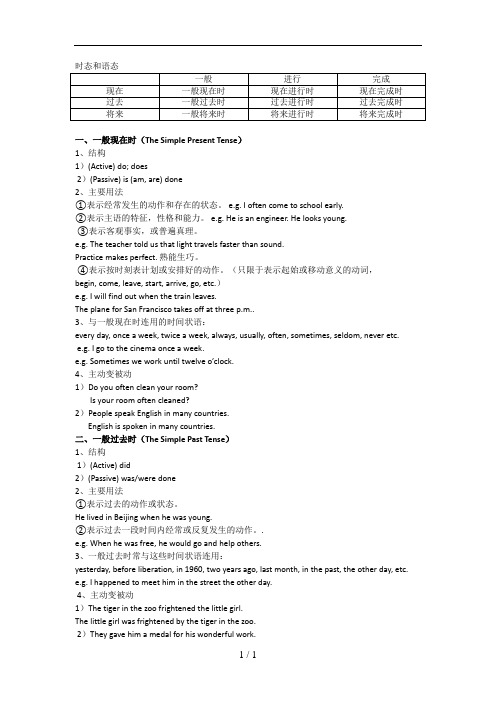
时态和语态一、一般现在时(The Simple Present Tense)1、结构1)(Active) do; does2)(Passive) is (am, are) done2、主要用法①表示经常发生的动作和存在的状态。
e.g. I often come to school early.②表示主语的特征,性格和能力。
e.g. He is an engineer. He looks young.③表示客观事实,或普遍真理。
e.g. The teacher told us that light travels faster than sound.Practice makes perfect. 熟能生巧。
④表示按时刻表计划或安排好的动作。
(只限于表示起始或移动意义的动词,begin, come, leave, start, arrive, go, etc.)e.g. I will find out when the train leaves.The plane for San Francisco takes off at three p.m..3、与一般现在时连用的时间状语:every day, once a week, twice a week, always, usually, often, sometimes, seldom, never etc. e.g. I go to the cinema once a week.e.g. Sometimes we work until twelve o’clock.4、主动变被动1)Do you often clean your room?Is your room often cleaned?2)People speak English in many countries.English is spoken in many countries.二、一般过去时(The Simple Past Tense)1、结构1)(Active) did2)(Passive) was/were done2、主要用法①表示过去的动作或状态。
情态动词的时态与语态变化规律解析
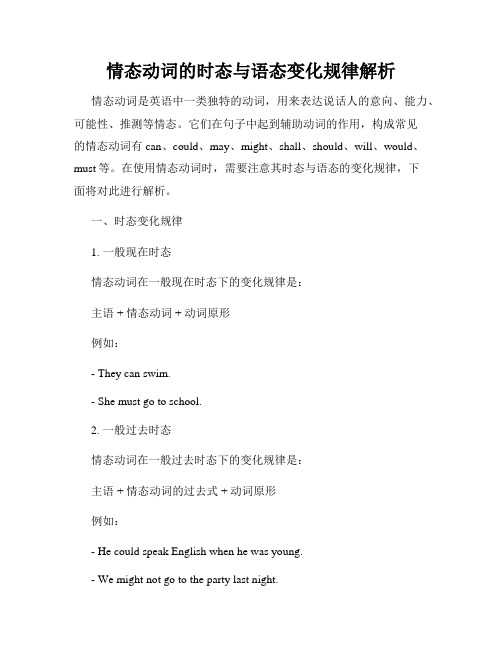
情态动词的时态与语态变化规律解析情态动词是英语中一类独特的动词,用来表达说话人的意向、能力、可能性、推测等情态。
它们在句子中起到辅助动词的作用,构成常见的情态动词有can、could、may、might、shall、should、will、would、must等。
在使用情态动词时,需要注意其时态与语态的变化规律,下面将对此进行解析。
一、时态变化规律1. 一般现在时态情态动词在一般现在时态下的变化规律是:主语 + 情态动词 + 动词原形例如:- They can swim.- She must go to school.2. 一般过去时态情态动词在一般过去时态下的变化规律是:主语 + 情态动词的过去式 + 动词原形例如:- He could speak English when he was young.- We might not go to the party last night.3. 一般将来时态情态动词在一般将来时态下的变化规律是:主语 + 情态动词 + 动词原形例如:- We will visit our grandparents tomorrow.- They may come to the party next week.4. 现在进行时态情态动词在现在进行时态下的变化规律是:主语 + be动词 + 情态动词的现在分词 + 其他动词例如:- She is canning the fruits.- They are maying to the beach.5. 过去进行时态情态动词在过去进行时态下的变化规律是:主语 + be动词的过去式 + 情态动词的现在分词 + 其他动词例如:- He was canning the fruits.- They were maying to the beach.二、语态变化规律1. 情态动词的主动语态情态动词的主动语态表示说话人的意愿、能力、可能性等,其变化规律与时态一致,即:主语 + 情态动词 + 动词原形例如:- He can swim.- They must finish the project.2. 情态动词的被动语态情态动词的被动语态表示说话人对某种行为的推测或可能性,其变化规律如下:主语 + 情态动词 + be动词的过去分词 + 其他动词例如:- The book can be read by everyone.- The food must be eaten before it spoils.综上所述,情态动词在使用时需要根据不同的时态与语态进行变化。
情态动词的时态变化及语气作用
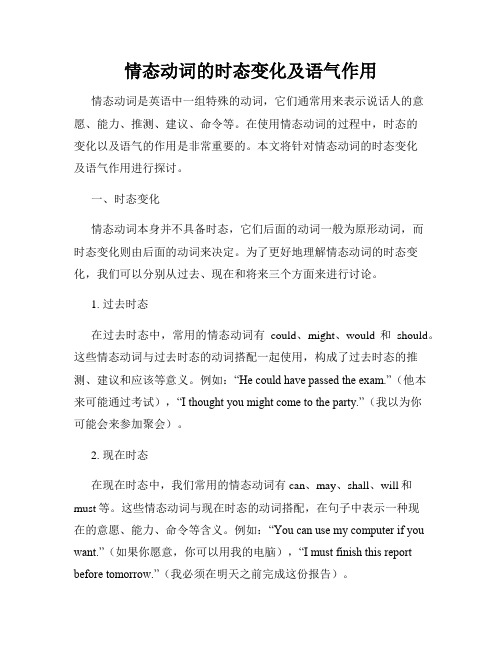
情态动词的时态变化及语气作用情态动词是英语中一组特殊的动词,它们通常用来表示说话人的意愿、能力、推测、建议、命令等。
在使用情态动词的过程中,时态的变化以及语气的作用是非常重要的。
本文将针对情态动词的时态变化及语气作用进行探讨。
一、时态变化情态动词本身并不具备时态,它们后面的动词一般为原形动词,而时态变化则由后面的动词来决定。
为了更好地理解情态动词的时态变化,我们可以分别从过去、现在和将来三个方面来进行讨论。
1. 过去时态在过去时态中,常用的情态动词有could、might、would和should。
这些情态动词与过去时态的动词搭配一起使用,构成了过去时态的推测、建议和应该等意义。
例如:“He could have passed the exam.”(他本来可能通过考试),“I thought you might come to the party.”(我以为你可能会来参加聚会)。
2. 现在时态在现在时态中,我们常用的情态动词有can、may、shall、will和must等。
这些情态动词与现在时态的动词搭配,在句子中表示一种现在的意愿、能力、命令等含义。
例如:“You can use my computer if you want.”(如果你愿意,你可以用我的电脑),“I must finish this report before tomorrow.”(我必须在明天之前完成这份报告)。
3. 将来时态在将来时态中,我们通常使用情态动词will来表示将来的意愿、能力、推测等含义。
例如:“I think it will rain tomorrow.”(我认为明天会下雨),“He will be able to solve the problem soon.”(他很快能够解决这个问题)。
二、语气作用除了时态的变化外,情态动词还有一种重要的作用,即在英语句子中起到一种特定的语气作用。
下面我们将介绍情态动词在不同语气中的作用。
八种时态及含有情态动词的主动、被动语态结构表
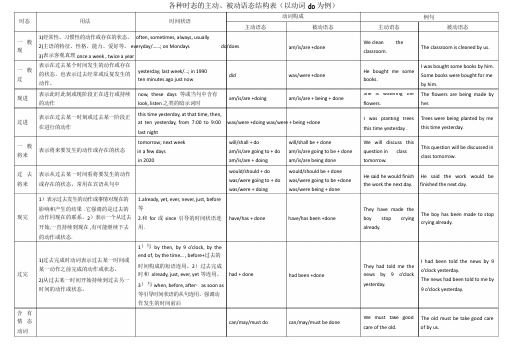
现进am/is/are+doing am/is/are+being+doneShe is watering the 过进I was planting treescan/may/must do can/may/must be done We must take good各种时态的主动、被动语态结构表(以动词do为例)时态用法时间状语动词构成主动语态被动语态主动语态例句被动语态一般现1)经常性、习惯性的动作或存在的状态。
often,sometimes,always,usually2)主语的特征、性格、能力、爱好等。
everyday/……;on Mondays do/does3)表示客观真理once a week,twice a yearam/is/are+doneWe clean theclassroom.The classroom is cleaned by us.一般过表示在过去某个时间发生的动作或存在的状态,也表示过去经常或反复发生的动作。
yesterday;last week/…;in1990ten minutes ago just nowdid was/were+doneHe bought me somebooks.I was bought some books by him.Some books were bought for meby him.表示此时此刻或现阶段正在进行或持续now,these days等或当句中含有的动作look,listen之类的暗示词时flowers.表示在过去某一时刻或过去某一阶段正在进行的动作this time yesterday.this time yesterday,at that time,then,at ten yesterday,from7:00to9:00was/were+doing was/were+being+donelast nightThe flowers are being made byher.Trees were being planted by methis time yesterday.一般将来tomorrow;next week表示将来要发生的动作或存在的状态in a few daysin2020will/shall+doam/is/are going to+doam/is/are+doingwill/shall be+doneam/is/are going to be+doneam/is/are being doneWe will discuss thisquestion in classtomorrow.This question will be discussed inclass tomorrow.过去将来表示从过去某一时间看将要发生的动作或存在的状态,常用在宾语从句中would/should+dowas/were going to+dowas/were+doingwould/should be+donewas/were going to be+donewas/were being+doneHe said he would finish He said the work would bethe work the next day.finished the next day.1)表示过去发生的动作或事情对现在的 1.already,yet,ever,never,just,before影响和产生的结果.它强调的是过去的现完动作同现在的联系。
英语十六种动词时态归纳表
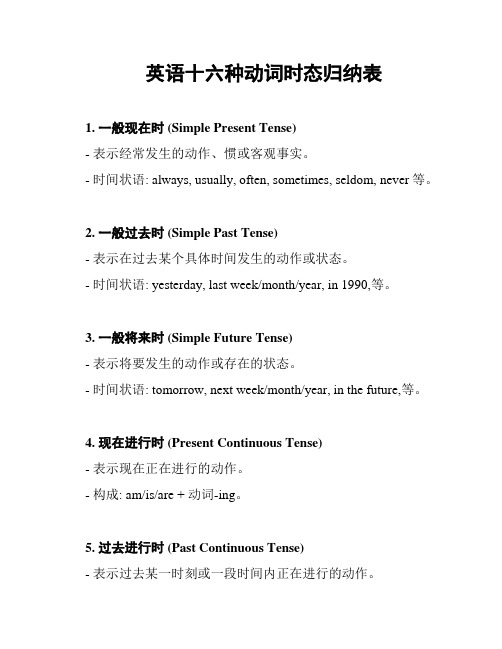
英语十六种动词时态归纳表1. 一般现在时 (Simple Present Tense)- 表示经常发生的动作、惯或客观事实。
- 时间状语: always, usually, often, sometimes, seldom, never等。
2. 一般过去时 (Simple Past Tense)- 表示在过去某个具体时间发生的动作或状态。
- 时间状语: yesterday, last week/month/year, in 1990,等。
3. 一般将来时 (Simple Future Tense)- 表示将要发生的动作或存在的状态。
- 时间状语: tomorrow, next week/month/year, in the future,等。
4. 现在进行时 (Present Continuous Tense)- 表示现在正在进行的动作。
- 构成: am/is/are + 动词-ing。
5. 过去进行时 (Past Continuous Tense)- 表示过去某一时刻或一段时间内正在进行的动作。
- 构成: was/were + 动词-ing。
6. 将来进行时 (Future Continuous Tense)- 表示将来某一时刻或一段时间内正在进行的动作。
- 构成: will be + 动词-ing。
7. 现在完成时 (Present Perfect Tense)- 表示动作对现在造成的影响或状态。
- 构成: have/has + 过去分词。
8. 过去完成时 (Past Perfect Tense)- 表示在过去某一时间点或动作之前已经发生的动作。
- 构成: had + 过去分词。
9. 将来完成时 (Future Perfect Tense)- 表示在将来某一时间点之前将会发生的动作。
- 构成: will have + 过去分词。
10. 现在完成进行时 (Present Perfect Continuous Tense)- 表示从过去某一时刻开始一直延续到现在且可能继续下去的动作或状态。
初中英语8种时态及情态动词的被动语态 总结表格版
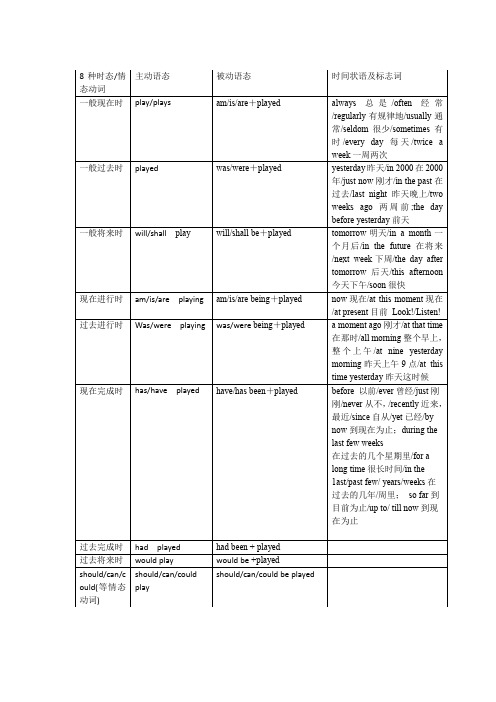
play/plays
am/is/are+played
always总是/often经常/regularly有规律地/usually通常/seldom很少/sometimes有时/every day每天/twice a week一周两次
一般过去时
played
was/were+played
yesterday昨天/in 2000在2000年/just now刚才/in the past在过去/last night昨天晚上/two weeks ago两周前;the day before yesterday前天
will/shall be+played
tomorrow明天/in a month一个月后/in the future在将来/next week下周/the day after tomorrow后天/this afternoon今天下午/soon很快
现在进行时
am/is/are playing
am/is/are being+played
should/can/could(等情态动词)
should/can/could play
should/can/could be played
时态解题步骤
看时间标志词确定时态看主语与动词关系确定语态看人称确定单复数
一般将来时
will/shallplay
will/shall be+played
tomorrow明天/in a month一个月后/in the future在将来/next week下周/the day after tomorrow后天/this afternoon今天下午/soon很快
现在进行时
am/is/are playing
英语中表达时和情态的方法
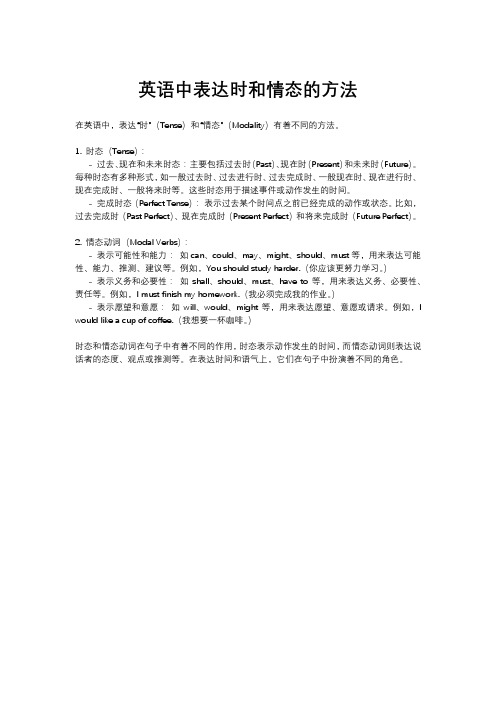
英语中表达时和情态的方法
在英语中,表达“时”(Tense)和“情态”(Modality)有着不同的方法。
1. 时态(Tense):
- 过去、现在和未来时态:主要包括过去时(Past)、现在时(Present)和未来时(Future)。
每种时态有多种形式,如一般过去时、过去进行时、过去完成时、一般现在时、现在进行时、现在完成时、一般将来时等。
这些时态用于描述事件或动作发生的时间。
- 完成时态(Perfect Tense):表示过去某个时间点之前已经完成的动作或状态。
比如,过去完成时(Past Perfect)、现在完成时(Present Perfect)和将来完成时(Future Perfect)。
2. 情态动词(Modal Verbs):
- 表示可能性和能力:如can、could、may、might、should、must等,用来表达可能性、能力、推测、建议等。
例如,You should study harder.(你应该更努力学习。
)- 表示义务和必要性:如shall、should、must、have to等,用来表达义务、必要性、责任等。
例如,I must finish my homework.(我必须完成我的作业。
)
- 表示愿望和意愿:如will、would、might等,用来表达愿望、意愿或请求。
例如,I would like a cup of coffee.(我想要一杯咖啡。
)
时态和情态动词在句子中有着不同的作用,时态表示动作发生的时间,而情态动词则表达说话者的态度、观点或推测等。
在表达时间和语气上,它们在句子中扮演着不同的角色。
- 1、下载文档前请自行甄别文档内容的完整性,平台不提供额外的编辑、内容补充、找答案等附加服务。
- 2、"仅部分预览"的文档,不可在线预览部分如存在完整性等问题,可反馈申请退款(可完整预览的文档不适用该条件!)。
- 3、如文档侵犯您的权益,请联系客服反馈,我们会尽快为您处理(人工客服工作时间:9:00-18:30)。
六年级英语专项练习:情态动词一、情态动词的定义:情态动词有词义,但它不能单独作谓语,它必须和其他动词一起构成谓语。
情态动词没有人称和数的变化;它的后面必须跟动词原形。
二、情态动词的种类:三、情态动词的用法及主要句型:1、Can I help you? ——Yes, please. / No, thanks.2、Can + 主语+ 动词原形? Yes, ~can. No, ~can’t.3、Can I borrow your book?----Yes,of course.4、Can I write on the book? ------No, you can’t\mustn’t.5、Could \Can you help me?---- Yes,of course.\Certainly.\ Sure.6、Could \Can you tell me the way to the Zoo?7、May I come in ?----- Come in, please.8、May I sit here?----- Yes, please.\Sorry, please don’t.9、May I have some Coke?---- Yes, of course.10、May/ Could / Can I speak to Tom? -----Speaking. Who’s calling?11、should 、shouldn’t 表示劝告:1) He should get up early.2) She shouldn’t play computer game too much.12、Should +主语+动词原形? Yes, ~should.\ No, ~shouldn’t.13、表示建议“你愿意…吗”Would you like to go shopping with me?-----Yes, I’d love to. /I’d love to. But I’m busy now.14、就餐用语Would you like something to eat\drink? ----Yes, I’d like…15、shall用于第一人称(I, we), 可以表示“将”和表示建议“……好吗?”1) Where shall we have dinner?2) Shall we go fishing? -----All right. \OK. \Good idea.16、Must + 主语+ 动词原形? ---Yes,~must.\No, ~needn’t.四、相关练习:(一) 用适当的情态动词填空。
1. Must I borrow the book with my ID card? No, you ________.2. ________ I use your car? Yes, you ________.3. ________ I go home now? No, you _________ stay here.4.My mother is ill. I _________ stay at home and look after her.5.________ you like some tea?6. You ________ take more exercise.7. ________ you tell me how to get to the Qingyun Park?8. The clock ________ tell us the time.9. ________ you like to go fishing with me?10. ________ we play football this afternoon?(二) 按要求改写句子。
1.I can run fast.I ________ ________ fast. (否定句)2.You must return the book now.(一般疑问句)________ I the book now? No, you ________.3.He can play basketball well. (一般疑问句)_______ he ______ basketball well?4.They must take the books out of the room. (否定句)They ________ ________ the books out of the room.5.He should get up early.(否定句)He _______ get up late.(三) 单项选择。
()1.you like some milk ? A .Would B.Could C .Can ()2.We pick the flower in the park. A.can’t B.don't C.mustn’t( ) 3.W e should more trees, and we shouldn’t cut any trees.A.plantB.plantingC.plants( ) 4.May I have some coffee?A.Yes,you have.B.Yes,you can.C.Yes,certainly. ( ) 5.Shall we visit the factory?A.Yes,we do.B.Yes, we shall. B.All right.( ) 6.Would you like something to eat?A.Yes,we would.B.Yes, I’d like some cakes.C.Yes, of course. ( ) 7.What can I do for you?A.Yes,you can.B.No,I can do it.C. Yes.I’d like some oranges.六年级英语专项练习:时态一、小学英语四种时态的比较。
(见表格)二、动词的变化规则。
三、用所给动词的适当形式填空:1.Listen!The children _______________(sing)in the classroom.2. The kite _____________ (be) broken last week.3.Look! The woman over there ______________ (look) at you.4.Mary ______________ (visit) her grandparents next Monday.5. Miss Li ______________(have) an English class every Tuesday.6.I ______________ (leave) for Shanghai tomorrow evening.7.Joan often ______________ (catch) the No.11 bus to work.8.He _____________much about Chinese.(not know)9.Tom often ______________(go) to school on foot. But yesterday was rainy. He ______________ (go) to school by bus.10. My mother usually ____________(watch) TV and ___________(wash) clothes on Sunday morning?11. I ____________(make) a model ship with Mike last Saturday.12. Today is a sunny day. We ______________ (have) a picnic this afternoon.13. ______________your sister often ______________(go)shopping?14. The boys ________________ (swim)in the river now.15.What __________ he ___________(do) in 1990 ? He __________(be) an office worker16.Everyone in my family_________ (be) busy now. But my brother____________(play) with the cat.17.Jim (go) swimming every Saturuday afternoon.18.They (fly) kites last weekend.19.She (watch) TV on Sundays, but this Sunday, she (do)20.What day (be) it yesterday?21.Don't talk. We (have) a lesson.22.Who (teach) you Chinese this term? Mr Green.23.He (see) a ten-yuan note on the ground just now.24.They (live) in a small town last year, but this year, they (move) to a city.25.Ben and his cousin (catch) some insects in the park yesterday.26.Look, the boys (sit) quietly.27.March (come) after February.28.Listen!The girls (sing) in the next room.29.It's ten to eight. My mother (wash) clothes.30.you always (have) bread for supper? No, I .31.there an umbrella behind the door? Yes, there .32.What your brother (do) on Sunday? He (make) a doll.33.you (go) to the cinema last night? Yes, he34.What are they doing? They (shop).35.his classmate usually (read) English in the morning?四、单项选择。
